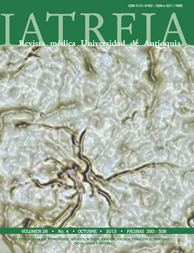The association atorvastatin-meloxicam reduces brain damage, attenuating reactive gliosis subsequent to arterial embolism
DOI:
https://doi.org/10.17533/udea.iatreia.14321Keywords:
Astroglia, Atorvastatin, Brain Ischemia, Gliosis, Meloxicam, ThromboembolismAbstract
The association atorvastatin-meloxicam reduces brain damage, attenuating reactive gliosis subsequent to arterial embolism Introduction: Stroke is the leading cause of disability and the third of death in Colombia and in the world and it is associated with neurodegenerative and mental diseases.
Objective: To determine the effects of the atorvastatin- meloxicam association on reactive gliosis in a model of cerebral ischemia produced by arterial embolization.
Materials and methods: 56 adult male Wistar rats were used, divided into four ischemic and four control groups, plus 10 additional animals to determine the distribution and extent of infarction by injury in six of them and simulation (sham) in the remaining four. The treatments were: placebo, atorvastatin (ATV), meloxicam (MELOX) and ATV + MELOX in ischemic and simulated animals. 24 hours post-ischemia mitochondrial enzymatic activity was evaluated with triphenyl- tetrazolium (TTC), and at 120 hours astrocytic reactivity (anti-GFAP) was analyzed by conventional immunohistochemistry.
Results: The association ATV + MELOX favored the modulation of the response of protoplasmatic and fibrous astrocytes in both the hippocampus and the paraventricular zone by reducing their hypereactivity. Conclusion: Atorvastatin and meloxicam, either individually or associated, reduce cerebral damage by lessening the reactive gliosis produced by arterial embolization; this suggests new mechanisms of neuroprotection against thromboembolic cerebral ischemia, and opens new perspectives in its early treatment.
Downloads
Downloads
Published
How to Cite
Issue
Section
License
Papers published in the journal are available for use under the Creative Commons license, specifically Attribution-NonCommercial-ShareAlike 4.0 International.
The papers must be unpublished and sent exclusively to the Journal Iatreia; the author uploading the contribution is required to submit two fully completed formats: article submission and authorship responsibility.














